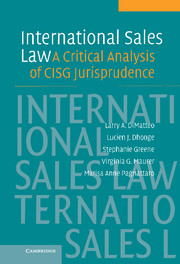Book contents
- Frontmatter
- Contents
- Preface
- Acknowledgments
- 1 INTRODUCTION
- 2 CISG METHODOLOGY AND JURISPRUDENCE
- 3 FORMATION: WRITING REQUIREMENTS
- 4 FORMATION: OFFER AND ACCEPTANCE RULES
- 5 OBLIGATIONS OF BUYERS
- 6 OBLIGATIONS OF SELLERS
- 7 COMMON OBLIGATIONS OF BUYERS AND SELLERS
- 8 BREACH OF CONTRACT BY SELLER
- 9 BREACH OF CONTRACT BY BUYER
- 10 DAMAGES, EXCUSE, AND PRESERVATION
- 11 SUMMARY AND OBSERVATIONS
- TABLE OF AUTHORITIES AND CASES
- APPENDIX A: UNITED NATIONS CONVENTION ON CONTRACTS FOR THE INTERNATIONAL SALE OF GOODS (CISG) (APRIL 11, 1980)
- APPENDIX B: CISG: TABLE OF CONTRACTING STATES (AS OF FEBRUARY 8, 2005)
- Index
2 - CISG METHODOLOGY AND JURISPRUDENCE
Published online by Cambridge University Press: 06 August 2009
- Frontmatter
- Contents
- Preface
- Acknowledgments
- 1 INTRODUCTION
- 2 CISG METHODOLOGY AND JURISPRUDENCE
- 3 FORMATION: WRITING REQUIREMENTS
- 4 FORMATION: OFFER AND ACCEPTANCE RULES
- 5 OBLIGATIONS OF BUYERS
- 6 OBLIGATIONS OF SELLERS
- 7 COMMON OBLIGATIONS OF BUYERS AND SELLERS
- 8 BREACH OF CONTRACT BY SELLER
- 9 BREACH OF CONTRACT BY BUYER
- 10 DAMAGES, EXCUSE, AND PRESERVATION
- 11 SUMMARY AND OBSERVATIONS
- TABLE OF AUTHORITIES AND CASES
- APPENDIX A: UNITED NATIONS CONVENTION ON CONTRACTS FOR THE INTERNATIONAL SALE OF GOODS (CISG) (APRIL 11, 1980)
- APPENDIX B: CISG: TABLE OF CONTRACTING STATES (AS OF FEBRUARY 8, 2005)
- Index
Summary
Chapters 3 through 10 offer a relatively comprehensive review of CISG jurisprudence. This review will allow an assessment of the problem of diverging national interpretations of the CISG. Before assessing the uniformity of CISG jurisprudence relating to its substantive rules, an understanding of the interpretive methodology provided by the CISG is necessary. Failure to understand and apply the CISG's interpretive methodology increases the likelihood of divergent interpretations through the improper use of domestic methodologies and legal constructs. This holds true for any multi-jurisdictional law, domestic or international. Professor Hawkland, referring to the Uniform Commercial Code (UCC) (United States), asserts that “a court should look no further than the code itself for solution[s] to disputes governed by it – its purposes and policies should dictate the result even where there is no express language.”
CISG's interpretive methodology provides a template for addressing substantive gaps or issues of law not directly (expressly) dealt with by the CISG. This template includes analogical reasoning by using CISG articles not directly related to the issue at bar and the use of the general principles of the CISG in fabricating default rules. Even though it is the job of a sales code, like the CISG or UCC, to provide default rules to be used to fill in the gaps of a contract, it is the role of the courts to give meaning to the rules in their applications to real world contract disputes.
- Type
- Chapter
- Information
- International Sales LawA Critical Analysis of CISG Jurisprudence, pp. 19 - 31Publisher: Cambridge University PressPrint publication year: 2005

